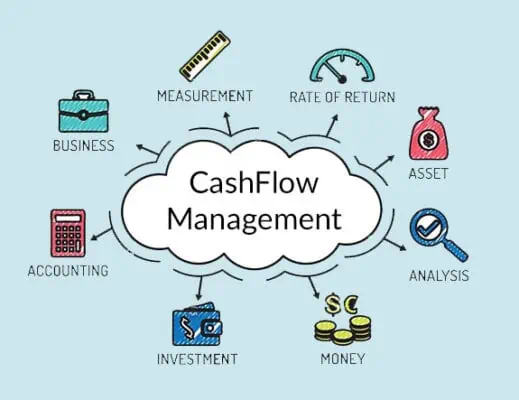What Is Business Cash Flow Management? Useful Guide For Small Business Owners

As a small business owner, you’re the captain of your ship, navigating through the ever-changing tides of the market. One crucial skill for steering your ship towards success is effective amount of cash management. Imagine enough cash on hand as the lifeblood of your business – it’s the constant movement of money in and out that keeps your operations afloat. In this guide, we’ll dive into the world of much cash management, business loan, uncover its significance, and equip you with practical strategies to ensure your business thrives.
1. Understanding Type of Cash Flow Statement and Positive Cash Flow
Before we delve deeper, let’s grasp the fundamentals. Cash balance is more than just revenue; it encompasses all the cash flowing into and out of your business. Inflows include sales, loans, and investments, while cash outflows comprise expenses like salaries, rent, and inventory costs. Think of it as a financial ebb and flow, where maintaining a positive balance is crucial to grow your business operations.
2. The Cash Flow Important Cycle of Small Business Owner
Visualize your business needs as a cycle, with distinct stages that impact your financial management health. First, there’s the inflow stage – cash comes in from sales and investments business expenses. Then comes the outflow stage, as you pay employees, suppliers, and cover other business expenses. Understanding this cycle helps you anticipate potential challenges and opportunities to get profitable business.
3. Importance of Calculate Cash Flow Management

Now, why is managing this flow so essential to running your business? Well, picture your business as a car engine. Without oil, it can’t function smoothly. Similarly, without proper cash, your business can grind to a halt. It ensures your day-to-day operations are well-oiled, and you’re ready to handle any unexpected financial roadblocks.
4. Challenges Faced by Small Businesses by Improve Cash Flow
Small business loan owners often face unique hurdles in managing money flow. Limited resources can lead to cash shortages, especially during growth phases. Seasonal many businesses finances may experience irregular income patterns, making consistent cash a puzzle.
5. Creating a Cash Flow Forecast to Improving Your Cash Flow
Imagine having a financial crystal ball. A cash forecast is the next best thing. It involves estimating your future cash inflows and outflows based on historical data and market trends. It’s like plotting your course using the stars – giving you a clearer picture of your financial voyage ahead from management strategies.
6. Effective Strategies for Managing Cash Flow Problem

Ahoy, strategies await! Streamlining accounts receivable and payable is like untangling anchor ropes. Negotiating favorable terms with suppliers is akin to steering through tricky waters. Monitoring inventory levels ensures you’re not overburdened, much like trimming excess cargo. Encouraging timely customer payments is like adjusting sails to catch favorable winds.
7. Example for Cutting Unnecessary Costs to Cash Flow Projection
Just as a sailor trims the sails to optimize speed, trimming costs optimizes your business. Identify expenses that aren’t contributing to your voyage’s success. Efficiently allocating resources is key to a streamlined journey.
8. Emergency Funds and Contingency Planning
The sea can be unpredictable, and storms can strike when least expected and so cash is king. That’s why having an emergency fund and a contingency plan is crucial. It’s like having lifeboats ready – ensuring your business stays afloat even in rough waters and financial health of your business.
9. Leveraging Technology about Cash Flow Analysis
In today’s digital age, technology acts as your navigational equipment. Accounting software and tools help you map your financial course with precision. Automation of tasks like invoicing and payment reminders simplifies your journey.
10. Seeking Professional Guidance about Operating Cash Flow
Even the most seasoned captains consult maps and experts. Financial advisors and accountants are like navigation experts, guiding you through intricate financial routes about the net amount of cash and flowing into your business. Their insights provide you with a compass to make informed decisions to get strong cash.
11. Case Studies about Manage Your Cash Flow
Let’s look at real-life examples. Company A struggled due to late payments. By implementing better invoicing practices and negotiating supplier terms, they transformed their financial voyage. Company B sailed smoothly by setting aside emergency funds, helping them navigate unexpected cash challenges.
12. Monitoring and Adjusting Strategies with Management Tools
Remember, the sea is ever-changing, and so is your business environment and keep your business monthly cash. Regularly monitoring your cash position performance is like keeping an eye on the horizon. If you spot a storm brewing, you can adjust your sails – tweak your strategies to stay on course to extra cash coming.
13. The Perplexity also Importance of Cash Flow Management Tools
Company’s Cash can be like deciphering a complex map. It’s not always straightforward, but it’s an art worth mastering. Just as the tides and currents can be perplexing, mastering cash requires understanding nuances and balance cash flow from financing because cash flow is the lifeblood.
14. Conclusion about Prepare a Cash Flow Statement of Business Owner

In the journey of entrepreneurship, mastering cash management is a compass that guides your business toward financial success. Remember, cash flow is important, is the heartbeat of your enterprise, and managing it effectively ensures a steady pulse. By implementing the strategies outlined in this guide, you’ll be well-equipped to navigate the seas of business, weathering challenges and seizing opportunities in the future cash flow.
15. FAQs for Cash Flow Issue of Small Buisness Owner
1. Why is cash on hand to cover crucial for small businesses? Effective cash ensures your business can cover day-to-day expenses, handle emergencies, and seize growth opportunities without stumbling with struggle with cash flow.
2. How can I create an accurate cash forecast? A cash forecast relies on historical data and market trends. By analyzing past performance and predicting future market movements, you can estimate your future about regular cash flow.
3. What’s the best way to encourage timely customer payments? Offering discounts for early payments, sending reminders, and providing various payment options can incentivize customers to settle their bills promptly, can business credit card.
4. Can cash prevent seasonal fluctuations? While it might not eliminate seasonal variations, proper management can help you prepare for leaner periods by setting aside reserves during peak times when create cash flow strategies.
5. Should I consult a financial advisor even for a small business? Yes, a financial advisor can provide valuable insights, help you strategize, and ensure your cash aligns with your business goals when you business on Shopify.
Remember, the journey of a small business is an adventure, and like any seasoned explorer, mastering the art of cash is essential for charting a successful course. By understanding, planning, and executing effective money flow management, you’re setting sail for a prosperous voyage in the world of business.
Private Agent for Dropshipping Success